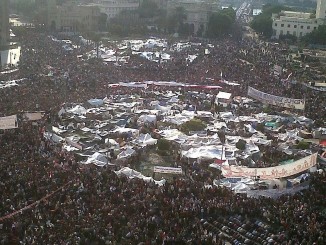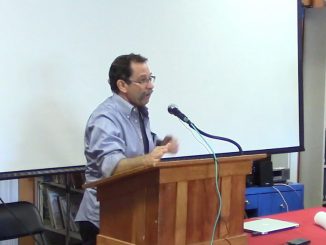Egyptians are out in the streets! The regime of President Mohammad Morsi, of the Muslim Brotherhood has ordered a curfew in three major Egyptian cities, but thousands of Egyptians are defying the government orders. Once again Egypt is in the midst of a social upheaval and ordinary people are making their power felt, this time against the Muslim Brotherhood.
Origins of the Revolution
Two years ago, the brutal regime of Hosni Mubarak was overthrown in a mobilization of the population. Mubarak had ruled Egypt for 30 years, longer than any of the Pharaohs. The Egyptian regime received $2 billion in military aid every year from the U.S., in addition to military training, and diplomatic support. In return, the Egyptian regime supported U.S. foreign policy. The economy of Egypt has been opened up to investment while wages and state services have been cut. Almost 40 percent of Egyptians are unemployed, and most live on two dollars per day. The revolution of 2011 was a direct result of people’s anger against Mubarak and the policies that he had carried out for decades.
The Brotherhood Is Not An Alternative
The only organized opposition to Hosni Mubarak until 2011 had been the Muslim Brotherhood. The brotherhood is an Islamic organization founded in 1928, representing Egyptian professionals and businessmen who criticize the corruption of the military, which has kept them from advancing and doing business. The Brotherhood also maintains a network of charitable organizations which give donations to the poor. The revolution was not started by the Brotherhood. The mobilization which led to the revolution was called by young people and activists. At first the Muslim Brotherhood opposed the revolution. Only when millions of people flooded Tahrir Square did the Brotherhood decide to support the demonstrations. What forced Mubarak to leave? It was when the working class of Egypt launched strikes against the regimes, especially when the workers of the Suez canal threatened to shut off the flow of international trade. The Muslim Brotherhood did not support those strikes.
Brotherhood Takes Power
But the Muslim Brotherhood took power after the revolution using their organization. For millions of Egyptians, especially those who had not participated in the revolution, the Brotherhood seemed to stand against the corruption of the old regime. In June 2012, the Brotherhood’s candidate, Muhammad Morsi, was elected to the presidency. The Brotherhood has not just relied on its credibility. It has been very quick to make deals with the U.S., promising to maintain the same policies as Mubarak. In return the Obama administration promised one billion dollars in military and economic aid. Clearly the Brotherhood aim to become the new rulers, just like Mubarak. In addition, the Brotherhood secured a promise of a $4.8 billion loan from the International Monetary Fund in return for promises to cut state services for the poor and lower wages.
Attack on the Revolution
The Brotherhood’s plan goes against the reason people made the revolution. Even before Morsi was elected there were huge protests and strikes. These have continued, with 3,400 protests or strikes in the last year alone. In order to maintain their power, the Muslim Brotherhood has attempted to limit the rights of the population. The Brotherhood supported the military’s use of force to break up strikes and demonstrations. On November 22nd, the Brotherhood pushed through a new constitution, giving Islamic authorities the right to rule on legal questions.
It is Not Over
The Brotherhood’s plans for a new constitution were met with the biggest demonstrations since the beginning of the revolution. All over Egypt people demonstrated, went on strike, and protested the Brotherhood’s policies. The protests were only suppressed by the combined force of the military and the Muslim Brotherhood.
What Next?
Millions of Egyptians still oppose every policy that the Muslim Brotherhood has put forward, and in the last weeks they have made their anger felt. The demonstrations began after the regime sentenced 21 young soccer fans, the “ultras”, to death. The authorities claimed they had been responsible for deadly riots in the city of Port Said in February. However it is widely believed by Egyptians that the authorities instigated those riots in February, and that the ultras are being blamed because these young soccer fans were very active in the revolution of 2011. Now tens of thousands of Egyptians in Port Said, Cairo and Ismailia have gone out night after night to protest the government-imposed curfew. The future is far from decided. The working class of Egypt and the millions of young Egyptians are looking for a different future than the one they are being given. The challenge will be not just to oppose the policies of the Muslim Brotherhood, but to replace their rule with a power that truly reflects the interests of ordinary Egyptians. The working class and poor of Egypt could then use the country’s resources to benefit the population, not just a few businessmen, politicians and the international corporations they serve. This would provide an example, not just for the rest of the Middle East but for the entire world.




